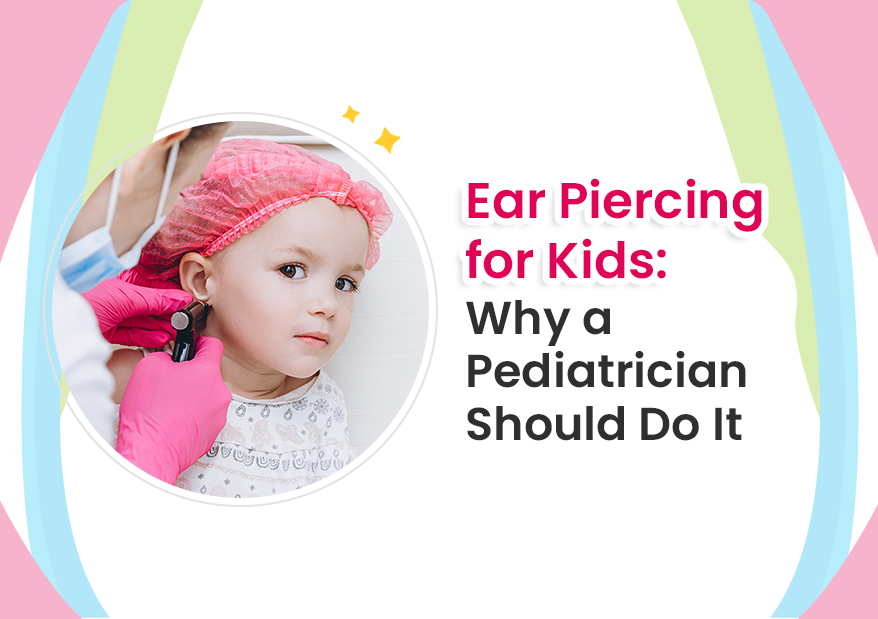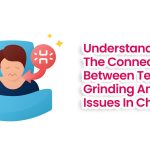The act of ear piercing for kids is a subject that sparks various opinions and practices. It is a personal choice for many people that is firmly based on their familial or cultural traditions. Some parents even regard it as an early opportunity to determine their child’s gender identification. Ear piercing has grown in popularity among people of all ages, far beyond infancy. It is now frequently considered a fashion statement and a form of self-expression. As a result, many parents choose to pierce their children’s ears while they are still toddlers, aligning with their own values and embracing the concept of individuality from an early age.
Regardless of the reasons behind choosing to pierce your baby’s ears, it is critical to prioritise their safety and well-being. Given the sensitive nature of your infants’ ears, the procedure should be performed by a Pediatrician.
When is the right time to pierce your baby’s ears?
Ear piercing for kids is a personal decision. Many doctors and piercing specialists suggest that children should not be pierced before they are ready. Though some cultures leave it to the choice of their children, some cultures consider piercing an infant’s ear as a ritual. In this case, it’s ideal to wait until your child is 4 months old and has received at least two sets of vaccinations. Many Pediatricians will not pierce a baby’s ears until the baby is 4 months old because the possibility of getting a fever at this age is very less.
If you decide to have your child’s ears pierced, go to a professional who uses sterile equipment and always carefully follow the aftercare recommendations so that the piercing heals properly.
Why should a Pediatrician pierce your baby’s ears?
The risks associated with a piercing can be greatly minimised by having it done by your Pediatrician rather than a retail jewellery store. The best pediatrician in Dubai provides pediatric ear piercing services on a regular basis.
When you take your child to their regular Pediatrician for ear piercing, the doctor will be familiar with your child and their medical history. They will be able to view your child’s vaccination history to confirm that they have had all necessary vaccinations prior to piercing. In addition, your child may feel more at ease with a doctor or nurse practitioner they know rather than a stranger in a jewellery store.
Another reason why ear piercing for your child should be done by a Pediatrician is the equipment utilised. Instead of a common piercing pistol found at the mall or other retail establishments, the Pediatrician will use medical-grade piercers. Never pierce your baby’s ears in a jewellery store or a shopping centre kiosk. These establishments typically use piercing guns (rather than needles) that may or may not be sterilised. Also, the workers are often untrained and receive little to no supervision.
Healthcare providers who pierce babies’ ears utilise sterilised needles and hypoallergenic surgical steel earrings created specifically for this purpose. They also utilise gloves when piercing and treat piercing as if it were a medical procedure.
Choosing the right metal and ear ring type
Choose hypoallergenic materials for your baby’s piercing earrings, such as sterling silver or 14-, 18-, or 24-karat gold. These metals are unlikely to induce allergic reactions. Keep in mind that nickel frequently causes allergic responses, so refrain from it throughout the piercing procedure.
For your baby’s first piercing, the AAP recommends choosing gold post earrings that are small, spherical, and as flat as possible.
Understanding the risks involved in ear piercing for kids
Before you decide to pierce your baby’s ears, you should be aware of the risks and precautions you should take.
Infection: There is a risk of infection with any ear piercings. Although, the risk is higher in babies, especially when they are very young. Infections happen when germs enter the piercing site, causing redness, swelling, discomfort, discharge, and fever. If your child is not old or responsible enough to care for their own ear piercings, it is the responsibility of you to keep them clean and healthy. Antibiotics and adequate care can be used to treat infected piercings. If an infection develops in a piercing and causes a fever, babies under the age of three months may need to be admitted to the hospital.
Allergies: Children may experience adverse reactions to the materials used in earrings. This is because some metals include nickel, which is a common allergy for many people. It is advised to wear only earrings made of metal such as gold or another nickel-free metal such as titanium or surgical steel.
Tearing: If an earring is tugged or snagged on something, people of all ages are at risk of damaging the piercing site. This is especially noticeable with long, hanging earrings. Until your child is older, they should only wear stud earrings that do not dangle.
Keloids: They are another side effect of ear piercing. Keloids form when scar tissue accumulates after piercing the ears. They can be irritating and painful, and surgical removal is sometimes required.
Pain: Ear piercing causes temporary pain, and your child’s ears may be uncomfortable for a day or so following, especially if touched. Though cleaning the earlobes with alcohol may sting your child at first, it will subside as the skin heals.
Ear trauma can occur if the piercing is done too aggressively or in the wrong place.
Preparing for your baby’s ear piercing
Proper preparation can make ear piercing less frightening and more comfortable for babies and children. There are various factors you must consider if you are considering medical ear piercing for your child. First and foremost, it is critical to select a recognised and certified Pediatrician to do the procedure. The medical practitioner should have prior experience working with newborns and young children, as well as a positive reputation in the community. If your child’s Pediatrician offers piercing services, well and good. Else, consult with your Pediatrician for recommendations.
If your baby is old enough to consume solids, pack a favourite snack to use as a distraction or tasty treat afterward. Just make sure your baby has nothing in their mouth before starting the procedure.
You can assist things go smoothly by holding your child tightly so they don’t move. Simultaneously, talk to them gently, sing a song to them, or read a book to them. Remain calm – if you panic, they will, too.
Aftercare for quick recovery
Aftercare is an important part of supporting the health and recovery of your baby’s newly pierced ears. It plays a major role in reducing the risk of infection and promoting good recovery.
- Clean your hands when handling the ears or earrings. Touching the piercing site with dirty hands can introduce bacteria and cause your baby to develop an infection.
- Most doctors recommend wiping the area with rubbing alcohol or another antibacterial product twice a day.
- Twist or rotate the earrings in your child’s ear at least once a day. This will keep them from getting stuck.
- It is critical to ensure that the piercings do not become damp after each bath. Grab a clean towel and gently pat the region dry after each bath.
- Check that the clasps are not excessively tight. The earrings should have some space from front to back, and the backing should not be forced up against the earlobe too tightly. This can put pressure on your baby’s tissues and disrupt their blood flow, slowing the recovery and raising the risk of infection.
- Keep an eye on the areas on a daily basis, and don’t forget to inspect behind the earlobe frequently. Be on the lookout for indicators of infection, such as increased redness and soreness regularly.
- Never put any pressure on the ear while cleaning or rotating, since this could be painful.
- To prevent tears, be careful not to pull on earrings when washing or brushing your child’s hair.
- Keep your youngster away from hot tubs, pools, and natural bodies of water while healing as exposure to water may raise the risk of infection. If your child does go swimming, make sure to clean their piercings afterward.
- Don’t change the jewellery too quickly, since this might disturb the healing process and result in an infection. It is normally recommended that you wait at least 6 weeks before replacing your jewellery. Furthermore, it is essential to ensure that the new jewellery is hygienic and made of hypoallergenic materials.
Contact your doctor right away if you observe any signs of infection, such as increasing redness, swelling, or pain. The kids specialist in Dubai may give antibiotics or recommend alternative treatments to help combat the infection
Book an appointment with the best Pediatric clinic in Dubai for consultation on ear piercing for kids.
myPediaclinic – the best Pediatric clinic for kids ear piercing in Dubai
Our experienced award-winning Pediatricians at myPediaclinic in Dubai Healthcare City help young children have a stress-free and relaxing visit. As one of the most trusted and kid-friendly clinics in the country, the doctors and staff at myPediaclinic are focused on delivering quality treatment and consultation for the long-term health and well-being of their patients.




